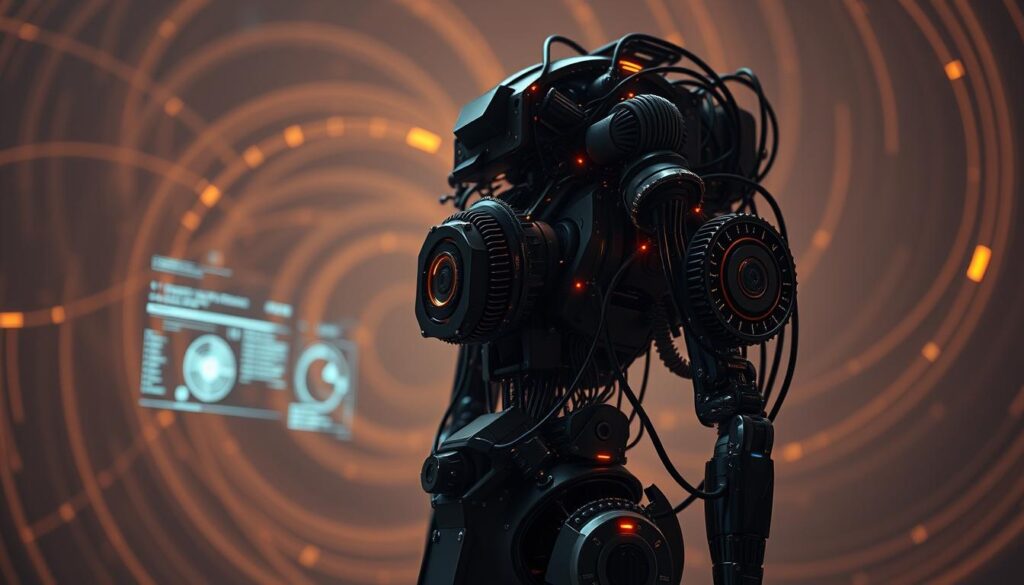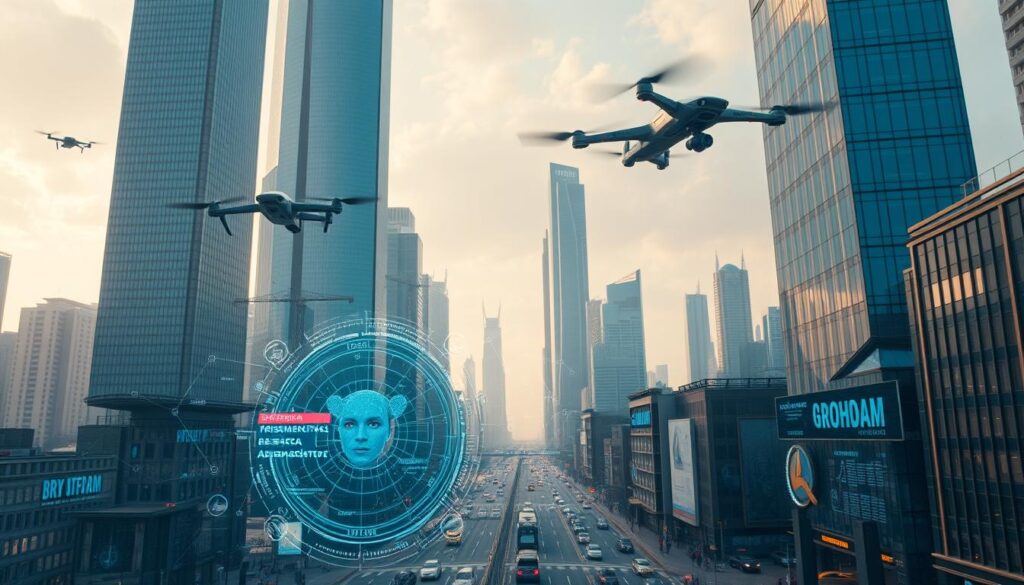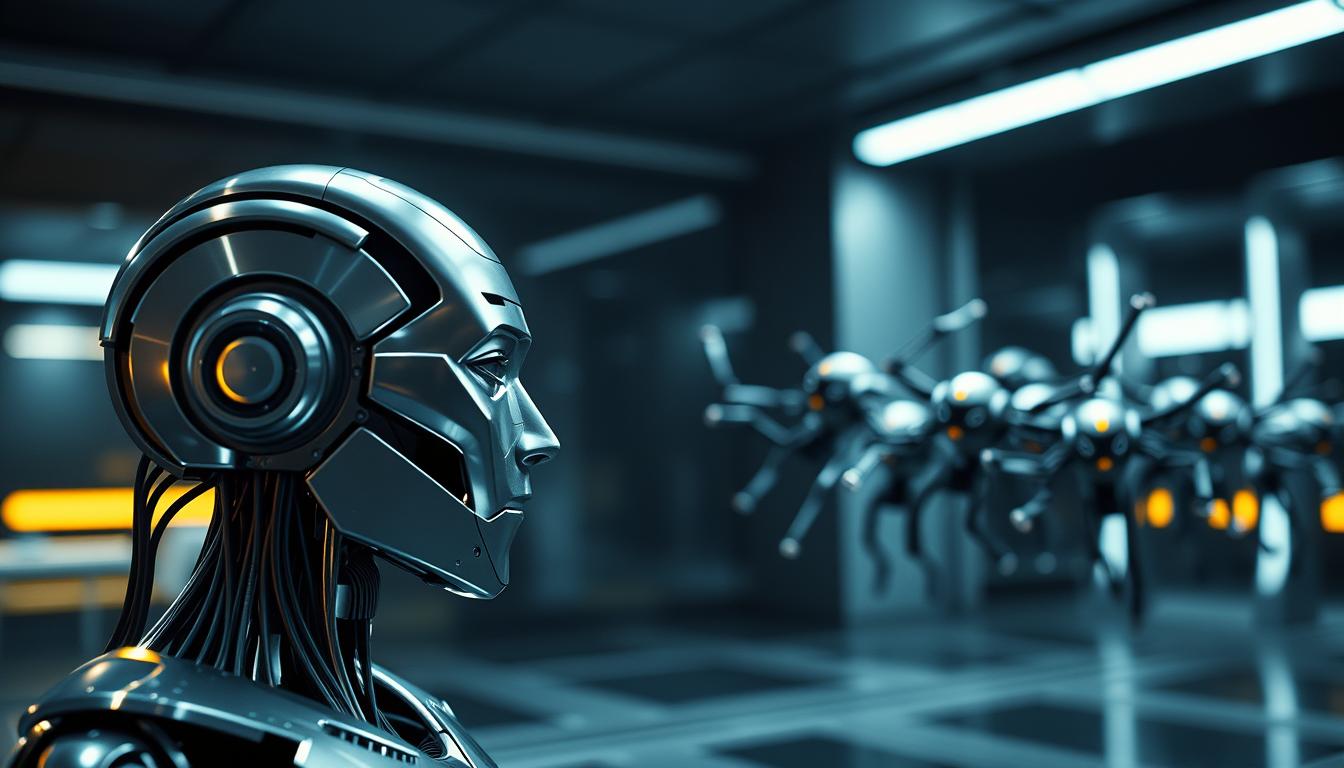In the fast-changing world of artificial intelligence, it’s key to know the difference between agentic AI and AI agents. Crowley Media Group, a top name in AI and automation, sees the big change these new ways of smart computing bring.
AI agents and agentic AI are two different but connected ideas in tech. Traditional AI agents do one thing well, but agentic AI wants to do more on its own. These new techs are changing how we solve big problems and automate tasks.
Now, 65% of companies are using generative AI and AI agents. This shows how important it is to understand the complex world of AI.
Key Takeaways
- Agentic AI systems are made for more complex, independent tasks
- Traditional AI agents are good at specific, set tasks
- 82% of companies plan to use AI agents in three years
- By 2028, about 15% of work decisions might be automated
- Technological progress is quickly improving AI’s abilities
Understanding the Fundamentals of AI Systems
Artificial intelligence has changed a lot. It has moved from simple models to smart agents that can make their own decisions. This change shows how technology keeps getting better and changing how we see smart machines.
The Evolution of Artificial Intelligence
AI has grown through many important steps. At first, agents were just simple rules. Now, they are complex and can adapt in new ways.
- 1950s: Initial computational models
- 1980s: Expert systems emerge
- 2000s: Machine learning breakthroughs
- 2020s: Advanced agency in AI
Core Components of Modern AI
Today’s AI systems use advanced tech to learn and decide. They have:
- Neural networks for recognizing patterns
- Machine learning algorithms
- Natural language processing
- Deep learning architectures
The Role of Autonomy in AI
Autonomous agents are the latest in AI. They can solve problems on their own. They can look at complex situations, find solutions, and act without much help from humans.
This growth shows AI’s power to change industries. It brings in smart, learning tech that keeps improving and expanding what machines can do.
What Makes Agentic AI Unique

Agentic AI is a new way of thinking about artificial intelligence. It’s not just about following rules. These systems can make choices on their own and work towards goals.
What makes agentic AI special includes:
- Advanced agency in AI that lets them think for themselves
- They can learn and change quickly
- They solve complex problems
- They interact with their environment in a smart way
Examples show how agentic AI can change things. Tesla’s Full Self-Driving system gets better at driving all the time. Darktrace uses agentic AI to find and fight cyber threats right away.
Agentic AI is different from old AI because it can:
- Handle lots of data fast
- Make smart choices with little help from humans
- Get ready for and adjust to new situations
- Work towards big goals over time
Agentic AI’s ability to act on its own makes it a game-changer in many fields. It’s bringing smart automation to healthcare and cybersecurity, and more.
Exploring AI Agents: Capabilities and Functions
AI agents are advanced software programs that can do things on their own in many areas. They are smart and can handle lots of information, make choices, and do complex tasks with little help from humans.
Rational agents are even more advanced. They can see their surroundings, understand data, and make plans to reach their goals. This makes them different from regular software because they can solve problems and learn on their own.
Types of AI Agents
AI agents can be grouped into different types based on how they work:
- Reactive Agents: They react to what’s happening around them right away.
- Learning Agents: They get better over time by analyzing data.
- Goal-Based Agents: They are made to achieve certain goals.
- Utility-Based Agents: They make decisions based on chances and outcomes.
Key Features of AI Agents
Agent-based AI systems have some key traits:
- They can make decisions on their own.
- They can see and understand their surroundings in real time.
- They can learn and get better over time.
- They can do tasks efficiently.
Common Applications
AI agents are used in many fields, like customer service, finance, healthcare, and security. They make complex tasks easier by doing things that used to need a lot of human help.
For example, chatbots help customers right away, and trading systems make quick investment choices. AI agents are changing how we interact with technology and making things more efficient.
Difference Between Agentic AI And AI Agents
It’s important to know the difference between agentic AI and AI agents. Both are key in the world of artificial intelligence. But they work in different ways to manage tasks on their own.
Agentic AI is a more advanced form. It has smart decision-making abilities. Unlike regular AI agents, agentic AI can:
- Process complex, multi-step problems
- Learn and adapt dynamically
- Make independent decisions with minimal human supervision
- Handle unpredictable environments
AI agents, on the other hand, are good at specific tasks. They follow rules and work well in set conditions. The main difference is their level of freedom and ability to learn.
Agentic AI’s decision-making agents are very flexible. They can look at big data, find patterns, and come up with new ideas. This is different from traditional AI agents, which work in more fixed ways.
Looking at real-world uses shows these differences. An AI agent might just book appointments or handle simple data. But agentic AI can tackle big tasks like improving supply chains, predicting market changes, or giving custom customer service.
Real-World Applications and Use Cases
Agent-based AI is changing industries with smart solutions that boost efficiency and innovation. Goal-oriented agents are changing how businesses tackle complex problems in many fields.
Companies are finding strong uses for rational agents in many areas. AI brings new levels of automation and smart decision-making.
Industry-Specific Implementations
- Healthcare: AI agents help make better treatment plans and guess what patients might need
- Finance: It spots fraud right away with deep data analysis
- Manufacturing: It watches over production lines and guesses when they might need fixing
- Retail: It makes shopping more personal by tracking what customers do
- Transportation: It’s working on self-driving cars and better traffic flow
Success Stories and Case Studies
Big companies are seeing big changes with goal-oriented agents. Call centers use AI to quickly understand what customers feel, check their order history, and help them fast.
Performance Metrics and Results
- 52% of companies see agent-based AI as key to their future
- 26% are really diving into making autonomous agents
- AI can cut down on manual work by up to 45%
- It makes customers happier with more personalized service
The future of rational agents looks bright, with more innovation on the way. They could help with planning, managing supply chains, and automating complex tasks.
Future Trends and Development Opportunities

The world of artificial intelligence is changing fast. By 2025, AI will be used in 70% of companies. This is a big change in how businesses use autonomous agents.
Many areas are seeing new chances for growth:
- Healthcare: AI agents will make patient medication summaries and give real-time treatment advice
- Cybersecurity: Advanced AI will watch networks all the time
- Marketing: AI will manage campaigns and make them better
- Customer Service: AI will solve complex problems without people
The third wave of AI is a big step forward. Agentic AI combines big language models with precise programming. This lets systems do complex tasks on their own. New jobs will include:
- AI agent trainers
- AI workflow orchestrators
- AI ethics compliance officers
Companies using these AI agents could see their productivity triple. They might need fewer workers. The principle of “human at the helm” is still key. It means humans make big decisions, but AI does the day-to-day work.
As we go further, agentic AI will keep changing industries. It will bring new efficiency and creative solutions.
Conclusion
The world of artificial intelligence is always changing. Intelligent agents and agentic AI are key to new tech. They help businesses solve big problems with the latest tech.
Decision-making agents are doing great things in many fields. They help with customer service and data work. AI agents are good at set tasks, but agentic AI can handle complex situations. By 2027, half of companies will use AI, showing its big impact.
Looking ahead, it’s important to know what AI can do. Companies need to think about what they need. They should choose between AI agents and agentic AI based on their needs.
Want to see how AI can change your business? Contact Crowley Media Group, experts in AI and automation. Visit crowleymediagroup.com or call (916) 572-9755. Learn how AI can help your business grow and innovate.
FAQ
What is the key difference between AI agents and agentic AI?
How do AI agents work in practical applications?
What makes agentic AI more advanced than traditional AI agents?
Can you give an example of an AI agent?
What are the primary types of AI agents?
How do agentic AI systems learn and improve?
What industries are most likely to benefit from agentic AI?
Are there ethical considerations with advanced AI systems?
How can businesses determine whether they need AI agents or agentic AI?
What is the future potential of agentic AI?
Source Links
- https://www.forbes.com/sites/bernardmarr/2025/02/25/the-important-difference-between-agentic-ai-and-ai-agents/
- https://www.moveworks.com/us/en/resources/blog/agentic-ai-vs-ai-agents-definitions-and-differences
- https://www.coursera.org/specializations/ai-agents-python
- https://www.dataiku.com/stories/detail/ai-agents/
- https://medium.com/@elisowski/ai-agents-vs-agentic-ai-whats-the-difference-and-why-does-it-matter-03159ee8c2b4
- https://www.ampcome.com/post/agentic-ai-vs-ai-agents-a-detailed-comparison
- https://www.getmagical.com/blog/agentic-ai-vs-ai-agents
- https://www.ibm.com/think/topics/ai-agents-vs-ai-assistants
- https://www.linkedin.com/pulse/difference-between-agentic-ai-agents-jay-narigara-lgudf
- https://aiveda.io/blog/ai-agents-vs-agentic-ai-a-comprehensive-technical-exploration
- https://www.ibm.com/think/topics/agentic-ai-vs-generative-ai
- https://www.uipath.com/ai/agentic-ai
- https://www.xenonstack.com/blog/agentic-ai-automation-agents
- https://www.fxmweb.com/insights/ai-agents-in-action-real-world-applications-of-agentic-ai.html
- https://www.techtarget.com/searchenterpriseai/feature/Real-world-agentic-AI-examples-and-use-cases
- https://www.linkedin.com/pulse/agentic-ai-vs-agents-whats-difference-why-matters-tejas-raval-qab6f
- https://www.forbes.com/sites/bernardmarr/2024/11/15/the-third-wave-of-ai-is-here-why-agentic-ai-will-transform-the-way-we-work/
- https://www.ibm.com/think/insights/agentic-ai
- https://writesonic.com/blog/ai-agents-vs-agentic-ai
- https://www.ailoitte.com/blog/agentic-ai-vs-ai-agents-comparison/
- https://www.geeksforgeeks.org/agentic-ai-vs-ai-agents/








